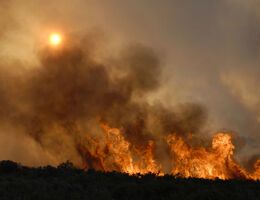How to cope with wildfire smoke

Aug. 16, 2024—Wildfire smoke can affect air quality—and harm your health—even when the fires are burning hundreds of miles away. Here's what everyone should know about the risks of wildfire smoke and how to protect yourself and your family.
Immediate effects
Like other air pollution, wildfire smoke contains fine particles that can harm your health in a variety of ways. And while we're still learning about the long-term effects of breathing in wildfire smoke, the U.S. Environmental Protection Agency reports that it can have immediate and serious effects.
In the short term, breathing in wildfire smoke can irritate your eyes and respiratory tract, stinging your eyes and giving you a runny nose and scratchy throat. It can also cause coughing, wheezing or shortness of breath.
Even healthy people may have trouble breathing normally when the air is very smoky. It can be worse for sensitive groups like children, older adults, pregnant women, and those with lung or heart disease. People in these groups can become very sick when a lot of smoke is in the air.
For example:
- People with asthma or COPD may have more flare-ups of their disease. These exacerbations can lead to emergency visits and hospitalizations.
- People with cardiovascular disease (heart and blood vessel problems) may experience worsening symptoms of their condition. They may even be at greater risk for heart attacks, strokes and worsening heart failure episodes.
- Children may cough, wheeze and have trouble breathing.
How to cope with smoke
Fortunately, there are ways you can help protect your health on smoky days. Try these strategies from the Centers for Disease Control and Prevention and other experts:
Stay indoors. When you see smoke in the air, check local air-quality reports (media outlets provide this information, as does AirNow.gov) and stay indoors if you are advised to do so. Close the windows and doors. If you have an air conditioner, run it with the fresh-air intake closed. If you don't have air conditioning and it's too hot to close the windows, consider staying with family or at a local shelter, if available.
Use an air purifier. You can buy a portable device that filters the air in your home to help keep it clean. You may want to run your air cleaner in a room where you and your family spend the most time.
Don't vacuum your home on smoky days. It stirs up smoke particles that may be on your carpets, making your indoor air quality potentially even worse.
Protect yourself if you must be outdoors. If you must go outside, avoid strenuous activities, like mowing the lawn or going for a run. Wear an N95 mask. Regular dust masks, like those you might wear to prevent breathing sawdust when working with wood, will not block smoke. Try to run errands during less-smoky times of day.
Follow the doctor's orders. If you have a lung or heart condition, follow your doctor's directions for managing it when air quality is poor. If you have questions or if your symptoms get worse, check with your doctor.
Sources
- AirNow. "Reduce Your Smoke Exposure." https://www.airnow.gov/sites/default/files/2021-07/reduce-your-smoke-exposure.pdf.
- Centers for Disease Control and Prevention. "How Wildfire Smoke Affects Your Body." https://www.cdc.gov/wildfires/risk-factors/index.html.
- Centers for Disease Control and Prevention. "Safety Guidelines: Wildfires and Wildfire Smoke." https://www.cdc.gov/wildfires/safety/how-to-safely-stay-safe-during-a-wildfire.html.
- Centers for Disease Control and Prevention. "Wildfire Smoke and People with Chronic Conditions." https://www.cdc.gov/wildfires/risk-factors/wildfire-smoke-and-people-with-chronic-conditions.html.
- U.S. Environmental Protection Agency. "Health Effects Attributed to Wildfire Smoke." https://www.epa.gov/wildfire-smoke-course/health-effects-attributed-wildfire-smoke.
- U.S. Environmental Protection Agency. "Which Populations Experience Greater Risks of Adverse Health Effects Resulting from Wildfire Smoke Exposure?" https://www.epa.gov/wildfire-smoke-course/which-populations-experience-greater-risks-adverse-health-effects-resulting.
